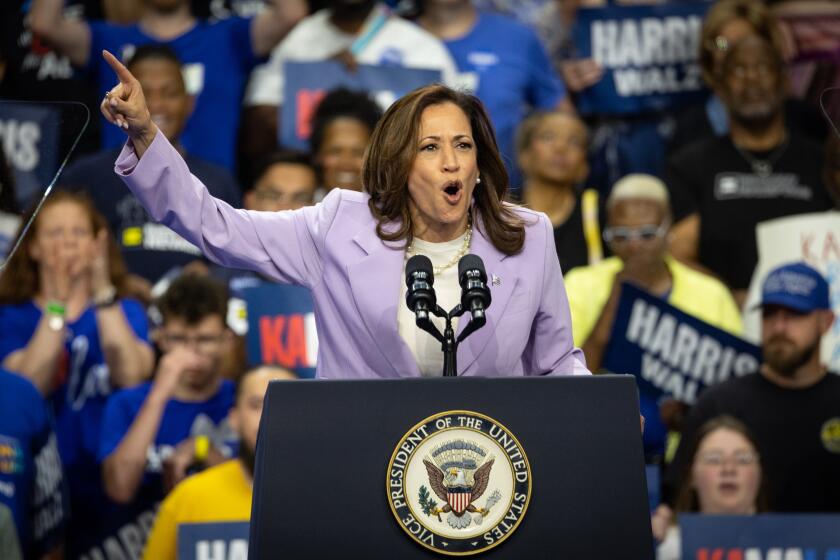Nunez Stalls Effort to Shut Workers’ Comp Loophole
A bill aimed at closing a loophole in the state’s workers’ compensation laws that allows doctors to profit from big markups on prescription drugs they sell to their patients appears all but dead for the current legislative session.
Assembly Speaker Fabian Nunez (D-Los Angeles) said he had derailed the measure, SB 292, even though it had sailed through the state Senate on a 40-0 vote and received only one negative vote in the Assembly Insurance Committee.
Nunez said last week that he wanted to hold the bill by Sen. Jackie Speier (D-Hillsborough) -- and all other workers’ comp bills -- until next year. He said he wanted to pressure Gov. Arnold Schwarzenegger and California employers to revisit the complex compromise that led to a complete overhaul of the state’s troubled workers’ compensation system during Schwarzenegger’s first few months in office in early 2004.
The speaker said he was particularly eager to force the Schwarzenegger administration to redo its formula for calculating benefits for workers who suffer permanent disabilities while on the job.
“We’re going to do the bill next year, but we’re going to do it right,” Nunez said. “And we’re going to look at doing a more comprehensive workers’ compensation reform.”
Schwarzenegger spokesman Vince Sollitto said the administration found it “disappointing and a little disturbing” that Nunez would use the Speier bill to gain political leverage on unrelated workers’ comp issues. He added that the administration was considering fixing the problem by issuing regulations that put ceilings on fees charged by doctors for the prescription drugs they dispense.
The Speier bill is backed by an atypical coalition of labor unions, the California Chamber of Commerce and major retailers, groups rarely in agreement when it comes to fixing California’s $24-billion-a-year system for aiding victims of workplace injuries. But crafting a similar compromise on the broader question of permanent disability benefits remains unlikely, chamber lobbyist Charles Bacchi said.
Unions and major employers such as Safeway Inc. have been working closely in an effort to convince lawmakers that the estimated $260 million spent annually on reimbursing doctors for high-priced medicines -- some sold at markups exceeding $500 for a single bottle of pills -- could be better used to lower workers’ comp insurance premiums or boost workers’ benefits.
But those arguments didn’t sway Nunez, at least not for now. He canceled a scheduled Aug. 25 Assembly Appropriations Committee hearing and vote on the bill. The cancellation all but ensured that the bill would not be acted upon before lawmakers adjourned Sept. 9.
Nunez, however, made at least one exception to his pledge to hold off action on all pending workers’ comp bills. He allowed a measure by Sen. Joe Dunn (D-Santa Ana), dealing with penalties against insurance companies for delaying claim payments, to pass out of the Assembly on Aug. 29, four days after he stalled action on Speier’s proposal.
Labor union officials said they were surprised that Nunez stalled Speier’s bill.
“I’m shocked we didn’t get a hearing on a bill that saves money,” said Angie Wei, legislative director of the California Labor Federation. “We know that some doctors are making money hand over fist at the expense of injured workers.”
Opponents of the Speier bill said they were pleased that the measure had been put on hold.
“We’re happy to have more time to work on the issue,” said Tom Calderon, a consultant and legislative strategist for the Pharmacists & Physicians Alliance. The group represents clinics that prescribe drugs to injured workers, and contends that doctors can better care for injured workers when they have the ability to fill prescriptions before patients leave a clinic.
Calderon, a former Democratic assemblyman from Montebello, was succeeded in the Assembly by his brother, Ronald Calderon, who has worked closely with Nunez to elect Democrats to the Legislature. Ronald Calderon has received more than $46,000 in political contributions from doctors and medical groups since January 2003. He, in turn, has contributed about $44,000 to state Democratic Party groups and candidates in the same period, according to filings with the secretary of state.
Ronald Calderon, who abstained from voting on the Speier bill in the Assembly Insurance Committee, agrees with Nunez’s call for a comprehensive workers’ comp restructuring before dealing with the prescription drug issue, Calderon spokesman Richard Garcia said.
Speier noted that her bill had been the target of heavy lobbying by the California Medical Assn. and a number of other advocates for physicians and specialized companies that repackage bulk drugs for sale directly to patients by doctors and clinics serving injured workers.
Although legislation signed by former Gov. Gray Davis in 2003 put price caps on reimbursements for prescription drugs sold to injured workers by pharmacies, the limits did not apply to the same drugs sold directly by doctors. Speier’s bill would apply the price caps to doctor-sold drugs.
According to promotional material from Southwood Healthcare Affiliates, a Lake Forest drug repackaging company that sells to clinics, doctors can earn average profits of $91.76 on prescriptions that cost them an average of $12.10.
“There is no rational explanation for why there should not be a [price] schedule for prescription drugs that are actually distributed by physicians,” Speier said. Some doctors, she said, are “spiking prices to an unseemly, egregious, greedy amount.”
More to Read
Get the L.A. Times Politics newsletter
Deeply reported insights into legislation, politics and policy from Sacramento, Washington and beyond. In your inbox three times per week.
You may occasionally receive promotional content from the Los Angeles Times.











